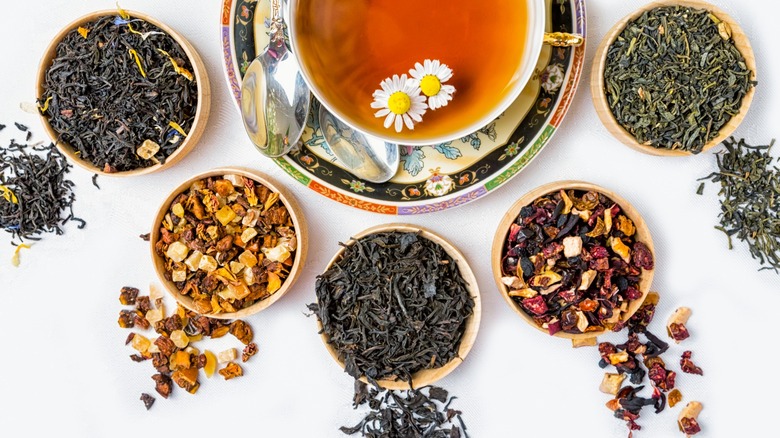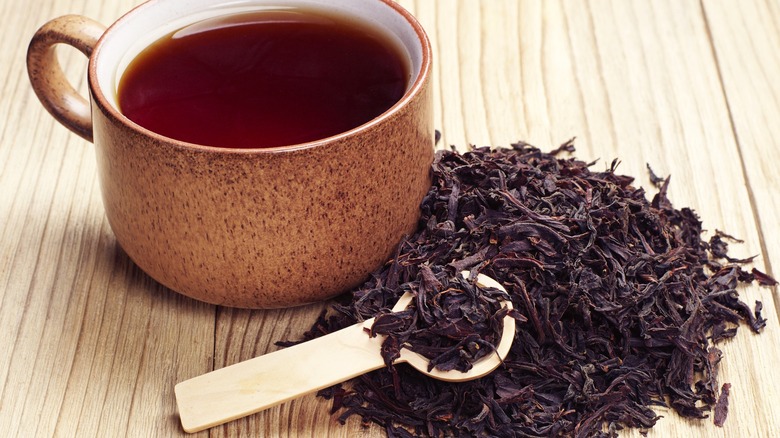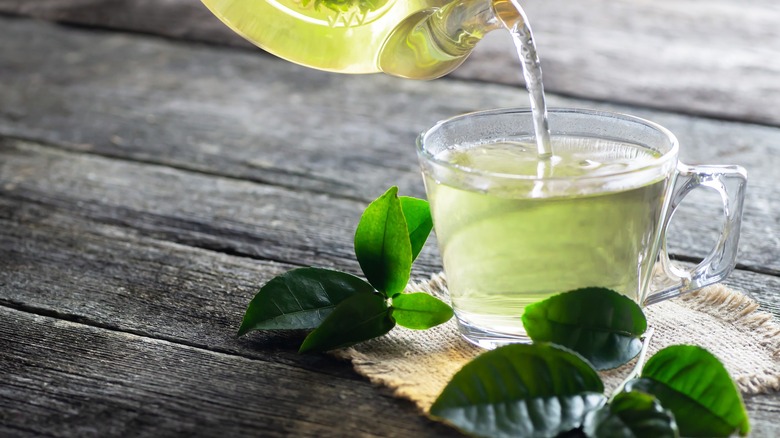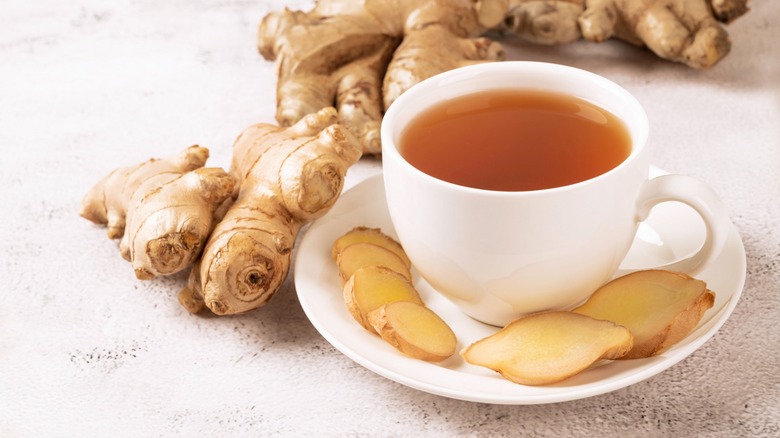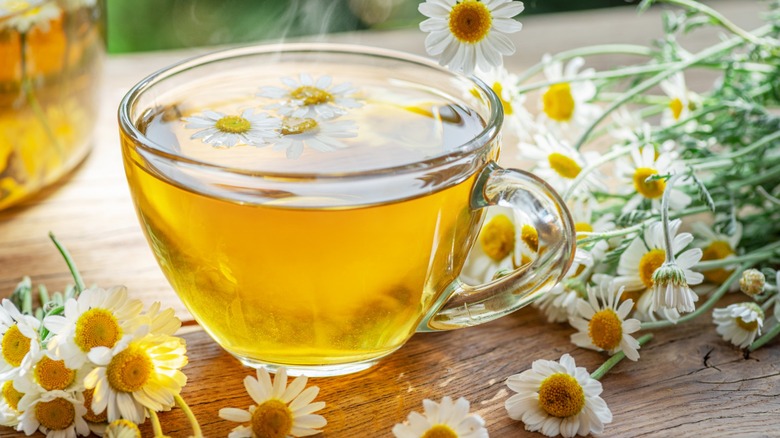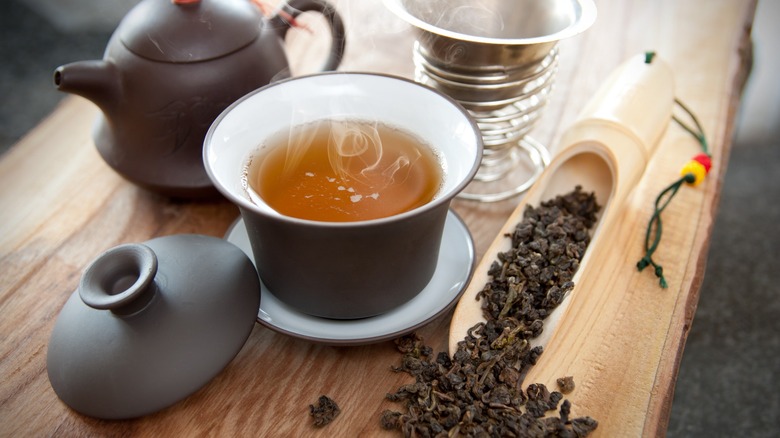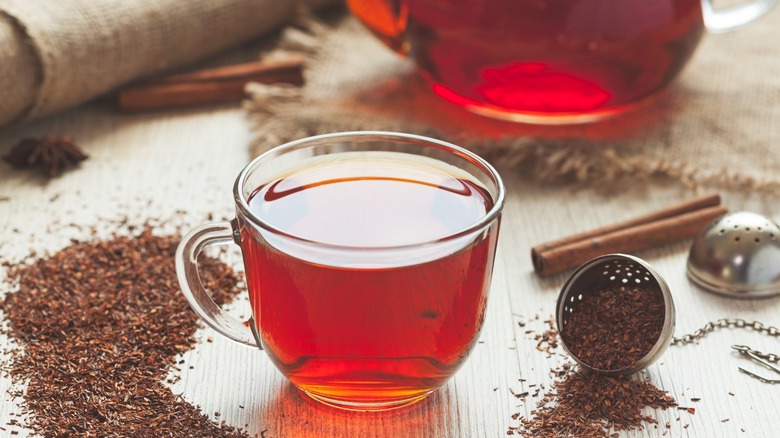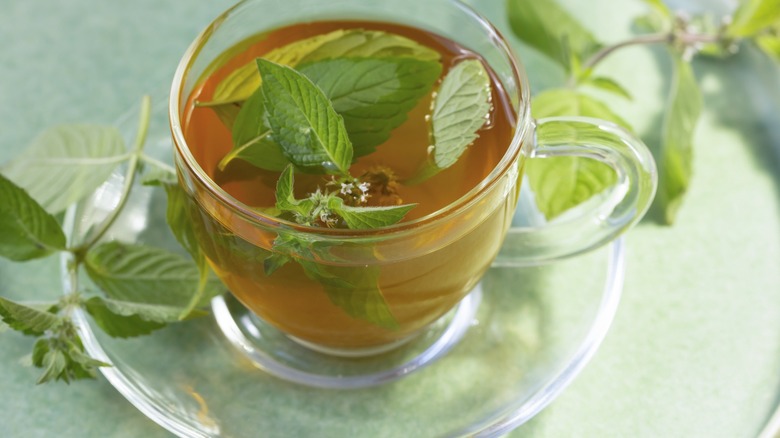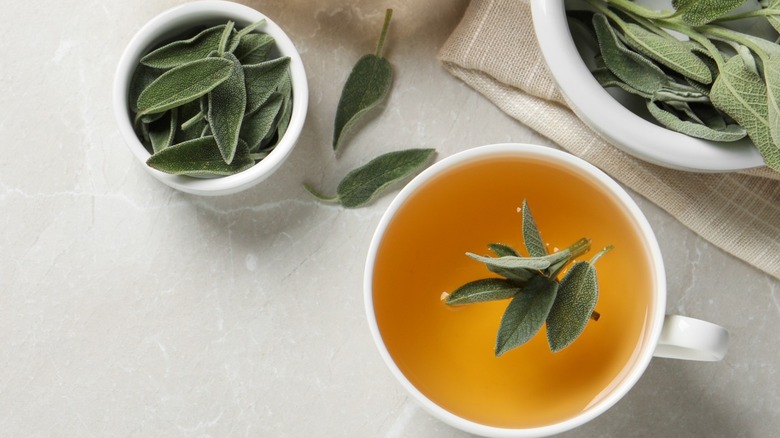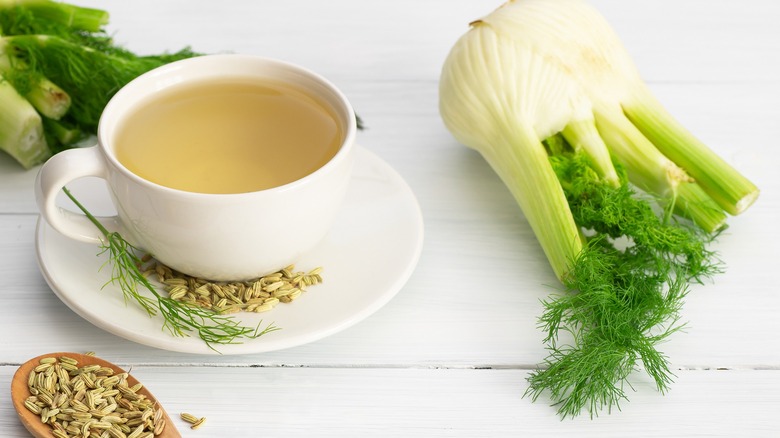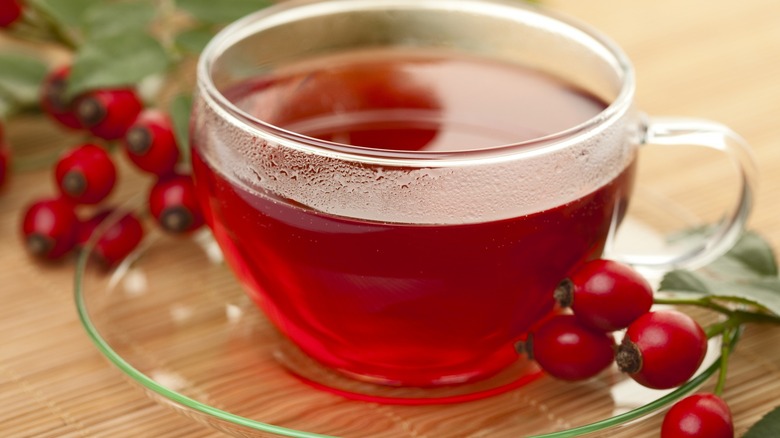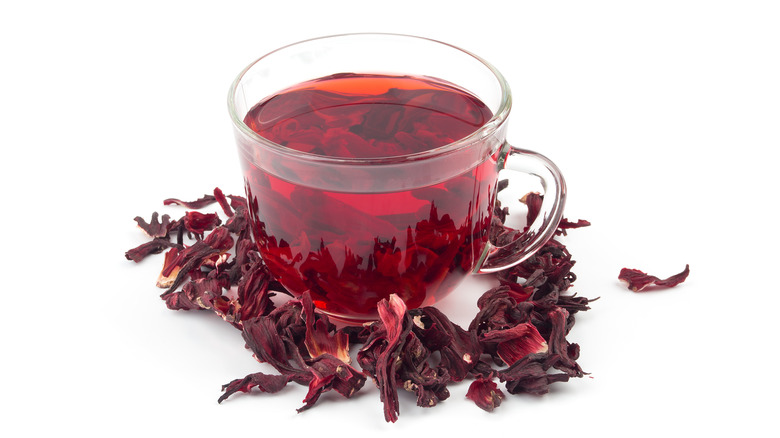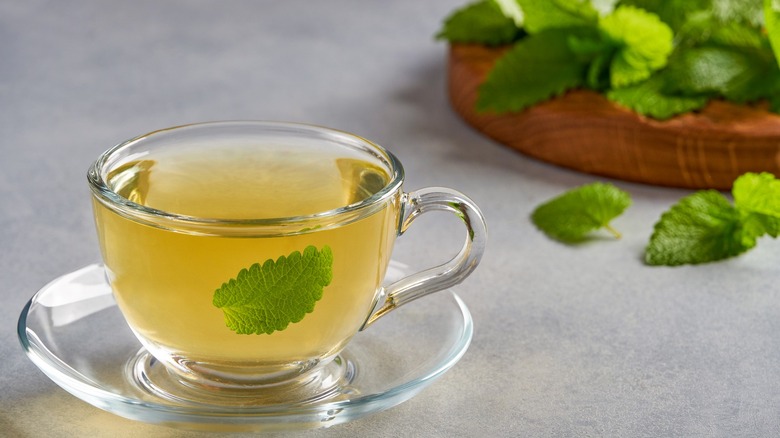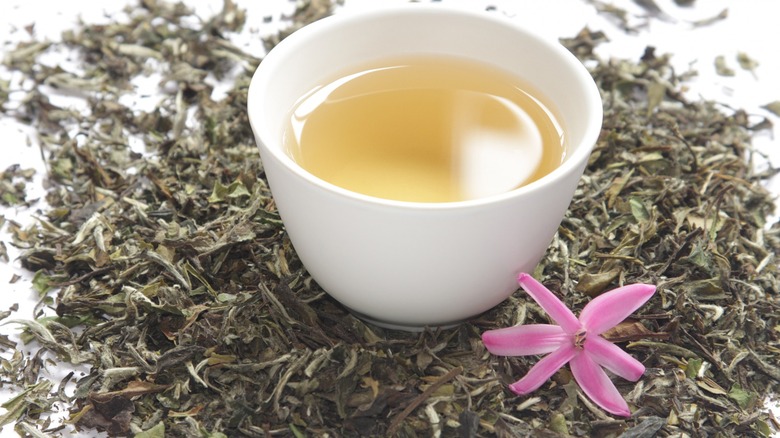13 Of The Healthiest Teas To Help Spice Up Your Day
There's nothing quite like a cup of tea to warm you up, soothe your troubles, or help you relax and unwind. As tea is the second most popular drink on the planet after water — whether your tea of choice is an invigorating English Breakfast in the morning, or a relaxing mug of chamomile tea before bed — you're not alone in your love of tea.
Tea isn't just good for the mind and soul, though. It also has a whole host of health benefits, depending on the type of tea you choose. From green tea to black tea to rooibos tea to sage tea, there are teas that will help you sleep, ease nausea, and even reduce your risk of heart disease.
We've rounded up 13 of the healthiest teas around. We'll look at the health benefits they can have, so you can choose your next tea based on its potentially health-boosting effects.
1. Black
There are many different types of black tea. You may have heard of types such as English Breakfast, Darjeeling, Ceylon, and Assam before. According to a study published in the journal Molecules, around 75% of all tea consumed worldwide is black tea. Plus, the Tea Association of the U.S.A. reports that black tea accounts for 84% of all tea consumed in the country in 2021.
It turns out that a cup of the dark stuff, with its rich, malty flavor, is actually pretty good for you too — provided you don't load it with sugar. Black tea is packed with antioxidant polyphenols like theaflavin, which may aid in blood sugar control, as well as help prevent some health conditions. Other studies — like this one published in the journal Anticancer Research — have also linked black tea with a reduced risk of ovarian cancer.
The polyphenols in black tea have also been studied for their links to accelerated metabolism and could have an effect on preventing obesity, according to animal and human studies. However, more research is needed before it can be conclusively stated that black tea could help with weight loss.
2. Green
Green tea is made with leaves from the camellia sinensis plant, according to Medical News Today. These leaves are cooked to stop oxidation, resulting in them retaining their green color and grassy flavor. Popular types of green tea include matcha, hojicha, and jasmine.
This type of tea packs a whole range of health benefits and is often seen as being one of the healthiest teas around. According to Healthline, green tea is packed with antioxidants like l-theanine, and polyphenols, such as catechin. These components have anti-inflammatory benefits.
A study published in the European Journal of Preventive Cardiology revealed that those who drank green tea were less likely to have illnesses such as heart diseases or strokes. In 2017, a research paper published in Phytomedicine Journal showed that drinking green tea could benefit brain function and mood. Green tea could also help improve oral health, as concluded by a 2021 review of studies.
3. Ginger
Ginger tea is the best tea to drink to settle an upset stomach. According to a study, it can help ease nausea and vomiting, particularly in pregnancy. You can grate fresh ginger root into a cup and top it with hot water, then let it steep for a few minutes, or buy ginger tea bags for convenience. Make sure you check tea bags, as they can often contain other ingredients — such as licorice, black pepper, or peppermint — which you may not want to ingest.
This tea is packed with antioxidants. It can also be helpful in easing menstruation pain, according to a scientific review. Additionally, ginger root could be used in the treatment and prevention of other stomach conditions, such as inflammatory bowel disease (IBS). This anti-inflammatory action could also help in relieving pain caused by arthritis.
Per one study, research also suggests that consuming ginger tea may offer some protection against heart disease by lowering blood pressure, improving circulation, and helping prevent heart attacks. With all these health benefits — and the fact that it's a warming, spicy drink — it's little wonder that ginger tea has become so popular.
4. Chamomile
The chamomile flower is part of the daisy family. As Sleepopolis explains, the plant itself has long been used to ease anxiety and insomnia, promoting restful sleep. Chamomile tea contains no caffeine and is a great beverage for those looking to relax and reduce their stress levels.
Experts recommend sipping a cup of chamomile tea before bed, as the plant's mild sedative effect can help you to feel calmer and alleviate stress. According to one study, this happens when the antioxidant apigenin — which is found in chamomile flowers — binds to receptors in the brain that may help decrease anxiety levels and help you sleep.
Because chamomile has a calming effect, it can also help treat menstrual cramps. One review published in the Journal of Pharmacopuncture explains that this is due to chamomile tea's anti-inflammatory qualities.
Drinking chamomile tea may also help relax the digestive tract — as one study reports — so a cup could ease symptoms such as nausea, indigestion, motion sickness, or diarrhea. There's also some evidence that it could help boost the immune system.
5. Oolong
Oolong tea is its own type of tea, just like green or black tea. It's also partially oxidized, which means that its flavor can vary in strength. It also means that the level of antioxidants it contains can vary. Generally speaking, though, this type of tea is packed with antioxidants.
Research shows that drinking oolong regularly significantly lowers your risk of developing high blood pressure. Another study – which was published in the British Medical Journals – showed that drinking oolong tea was associated with a lower risk of death caused by cardiovascular disease.
Drinking oolong tea could reduce the risk of having a stroke, too. A study published by the Journal of the American Heart Association showed that adults who drank up cups of oolong tea daily saw a significantly lower risk of stroke. With all of the possible benefits out there, it's worth giving oolong tea a try.
6. Rooibos
Rooibos tea uses leaves from the Aspalathus linearis plant, which is grown on South Africa's west coast. These leaves are fermented, giving rooibos its deep, earthy red color. Rooibos is sometimes drunk like black tea, with milk or sugar added to taste. Unlike some other teas, it's naturally caffeine-free, too.
Research suggests that the consumption of rooibos tea could boost heart health. One study published in PubMed revealed that drinking rooibos could help lower blood pressure. Rooibos may also reduce your cancer risk. One study published in the Anticancer Research Journal revealed that antioxidants in rooibos could prevent the growth of tumors and kill cancer cells.
Because rooibos contains no caffeine, it's often a great switch for people who currently enjoy black tea, but are looking to lower their caffeine intake. On the other hand, you could enjoy a cup of this tea before bed, when it's best to avoid caffeinated beverages.
7. Peppermint
Peppermint tea — which is made from the leaves of the Mentha piperita plant — not only tastes great and freshens your breath, but also has a number of health benefits. It contains no caffeine, tastes naturally sweet, and is a great option if you're experiencing digestive issues.
Nothing beats a steaming hot cup of peppermint tea for stomach upset, gas, indigestion, and bloating. Research has even shown that since peppermint helps your digestive system to relax, it could be useful in the treatment of symptoms of irritable bowel syndrome, according to a study published on PubMed.
But the benefits don't stop there. If you experience migraines or tension headaches, the aroma of peppermint tea could help, since peppermint acts as a muscle relaxant, as Healthline explains. It could even ease your blocked sinuses, as the menthol in peppermint tea can make it feel as though it's easier to breathe. Finally, if you've been low on energy, sipping some peppermint tea could be the key to feeling more energetic. Some of the natural compounds that peppermint contains could be good news for energy levels.
8. Sage
Sage is a member of the mint family, and its leaves have been used medicinally for centuries. You can make your own sage tea by steeping sage leaves — readily available in most grocery stores — in hot water, or buying tea bags. As well as being a refreshing drink, sage tea could boost your health in various ways.
Healthline reports that antibacterial agents in sage can reduce oral bacteria, as well as reduce throat and mouth inflammation for better oral health. Sage tea can also be used by women going through menopause, to relieve symptoms such as insomnia and hot flashes.
There's some evidence to suggest sage may be useful in the treatment of Alzheimer's disease. Patients with the disease have falling levels of acetylcholine (ACH), a chemical messenger that has a role to play in memory. Studies show that sage can stop ACH from breaking down, improving cognitive function in patients.
There have been a number of studies carried out on this topic. In one group trial, participants who consumed sage during a four-month period scored higher on reasoning, problem-solving, and memory tests, amongst other cognitive tests.
9. Fennel
Foeniculum vulgare, commonly known as fennel, has been used as a medicinal plant for hundreds of years. Fennel tea is naturally caffeine-free and provides similar health benefits to consuming the seeds, which are often used in stews and curries for their licorice flavor.
Fennel tea is said to be a digestive aid and can relax the stomach muscles, reducing cramping and bloating, according to Medical News Today. As such, it's often used to treat the symptoms of irritable bowel syndrome, ulcerative colitis, and other stomach conditions.
If you suffer from period pain, fennel tea could be the solution you need. It's thought that fennel helps prevent contraction of the uterus, which could reduce or eliminate painful periods, with women in a 2020 study published in Nutrients Journal reporting relief from consuming fennel tea.
Some herbalists believe that fennel tea could even help to reduce blood sugar. More studies need to be carried out to be sure, but one study published in the Food Science & Nutritional Journal showed that mice treated with fennel extract saw a similar reduction in blood sugar levels.
10. Rosehip
Rosehip tea is made from rosehips, the fruit from rose plants. These little red or orange fruits have been used medicinally to treat many conditions. According to Healthline, they also contain more vitamin C than most fruits or vegetables, as well as fatty acids, and anti-inflammatory compounds. The vitamins C, A, and E in rosehip tea may all help to strengthen your immune system.
To ensure you're getting the maximum amount of vitamin C from your rosehip tea, you should brew your tea using fresh rosehips — as WebMD explains. When rosehips are stored and dried, a lot of the vitamin C content is lost.
All that vitamin C could help keep your heart healthy too. Studies have shown that a lack of vitamin C could lead to an increased risk of death from heart disease, according to a study published in the International Journal of Molecular Sciences. It may even help those with type 2 diabetes, by lowering blood glucose levels.
11. Hibiscus
The hibiscus sabdariffa plant originally comes from Southeast Asia and North Africa. Hibiscus tea is made from the dried calyx, the part of the plant which holds the flower. With a tart, sweet taste that's similar to cranberry, hibiscus tea is a gorgeous deep red color, free from caffeine, and can be served hot or iced.
For decades, people in Africa have used hibiscus as a treatment for heart disease and to soothe a sore throat, while Iranians use it in the treatment of high blood pressure. There's some evidence to support this, too. A study published in the Journal of Nutrition revealed that those with slightly high blood pressure — and those at risk of high blood pressure — experienced reduced blood pressure after consuming hibiscus tea habitually.
Hibiscus may impact cholesterol levels, too, although more studies are needed for this to be conclusive. One study in 2011 showed that participants saw notable increases in their HDL (good) cholesterol levels after consuming hibiscus tea for a few weeks.
While it's safe to consume two to four cups of hibiscus tea daily, it can cause toxicity in high doses. As Medical News Today explains, it isn't safe for pregnant or breastfeeding women. Hibiscus may interact with blood pressure or diabetes medication. It may cause liver damage if too much is consumed.
12. Lemon balm
Melissa officinalis, or lemon balm, is part of the mint family. This plant has been used for centuries to ease the pain of indigestion, boost appetite, improve sleep, and reduce anxiety and stress.
Studies show that lemon balm tea could boost your mood and benefit cognitive performance, so it's the ideal tea to sip before an exam or important meeting. A 2021 study published in Nutrients Journal revealed lemon balm had positive effects on symptoms of depression and anxiety, and improved concentration and memory. If you suffer from painful periods, lemon balm tea might also help. A 2017 study published in the Iranian Journal of Pharmaceutical Research showed that the antispasmodic qualities of lemon balm helped reduce moderate to severe PMS symptoms.
There hasn't been much research carried out into the effects lemon balm alone has on insomnia. However, one study involving postmenopausal women with sleep disturbance showed that consuming the herb did improve the quality of sleep.
Anyone with a thyroid disorder should consult their doctor before consuming lemon balm, as it can be used in the treatment of hyperthyroidism from Grave's Disease, according to Medical News Today. It's also not suitable for consumption by pregnant or breastfeeding women.
13. White
White tea is made from the Camellia sinensis plant — the same plant we get green tea and black tea from. It's packed with antioxidants, as it undergoes much less processing than the other two teas, according to a study. White tea is so-called as the buds and leaves are harvested before they open, at which point they are covered in fine white hairs.
White tea can help fight free radicals, which may be responsible for inflammation and many harmful diseases. Reducing inflammation could also protect your heart. Studies have shown that consumption of polyphenols may prevent oxidation of LDL (bad) cholesterol, reducing your risk of heart disease.
Drinking white tea may also help you to lose weight. As Healthline reports, white tea contains caffeine, as well as epigallocatechin gallate (EGCG), a compound that may be linked to burning fat. A review of studies shows drinking white tea may help you burn up to an additional 100 calories a day, boosting your metabolism by up to 5%.
Older people may wish to consider swapping their regular cup of tea for the white stuff. That's because it may protect against osteoporosis, a condition that causes bones to become hollow, often leading to fractures.
